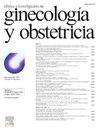Investigating the impact of sleep disorders on intracytoplasmic sperm injection outcome: A prospective observational study
IF 0.1
Q4 OBSTETRICS & GYNECOLOGY
Clinica e Investigacion en Ginecologia y Obstetricia
Pub Date : 2025-04-11
DOI:10.1016/j.gine.2025.101034
引用次数: 0
Abstract
Background
The relationship between sleep quality and outcomes of assisted reproductive technologies (ART), particularly intracytoplasmic sperm injection (ICSI), remains relatively unexplored. Understanding this association is crucial for optimizing fertility treatments and improving success rates. This study aimed to investigate the impact of sleep quality on ICSI outcomes and explore potential correlations with various variables.
Methods
A prospective observational study was conducted on 150 infertile couples undergoing ICSI treatment. Demographic, clinical, and sleep quality data were collected. Statistical analyses, including Spearman's correlation and multiple linear regression, were performed to assess the relationships between sleep quality, treatment variables, and outcomes.
Results
The mean age of participants was 32.71 years, with a majority residing in rural areas. No significant differences were found in pregnancy rates or embryo characteristics across different sleep quality groups. However, moderate positive correlations were observed between sleep quality scores and fertilization rates (p < 0.05).
Conclusion
While sleep quality did not significantly impact ICSI outcomes in this study, moderate correlations were found with fertilization rates. Further research is needed to elucidate the complex interplay between sleep quality, reproductive treatments, and outcomes to optimize fertility care.
研究睡眠障碍对卵胞浆内单精子注射结果的影响:一项前瞻性观察研究
背景睡眠质量与辅助生殖技术(ART),尤其是卵胞浆内单精子显微注射(ICSI)的结果之间的关系尚未得到深入研究。了解这种关系对于优化生育治疗和提高成功率至关重要。本研究旨在调查睡眠质量对卵胞浆内单精子显微注射(ICSI)结果的影响,并探讨其与各种变量之间的潜在关联。研究收集了人口统计学、临床和睡眠质量数据。结果参与者的平均年龄为 32.71 岁,大多数居住在农村地区。不同睡眠质量组的怀孕率和胚胎特征无明显差异。结论在这项研究中,虽然睡眠质量对卵胞浆内单精子显微注射的结果没有显著影响,但与受精率有一定的相关性。需要进一步研究阐明睡眠质量、生殖治疗和结果之间复杂的相互作用,以优化生育护理。
本文章由计算机程序翻译,如有差异,请以英文原文为准。
求助全文
约1分钟内获得全文
求助全文
来源期刊

Clinica e Investigacion en Ginecologia y Obstetricia
OBSTETRICS & GYNECOLOGY-
CiteScore
0.20
自引率
0.00%
发文量
54
期刊介绍:
Una excelente publicación para mantenerse al día en los temas de máximo interés de la ginecología de vanguardia. Resulta idónea tanto para el especialista en ginecología, como en obstetricia o en pediatría, y está presente en los más prestigiosos índices de referencia en medicina.
 求助内容:
求助内容: 应助结果提醒方式:
应助结果提醒方式:


